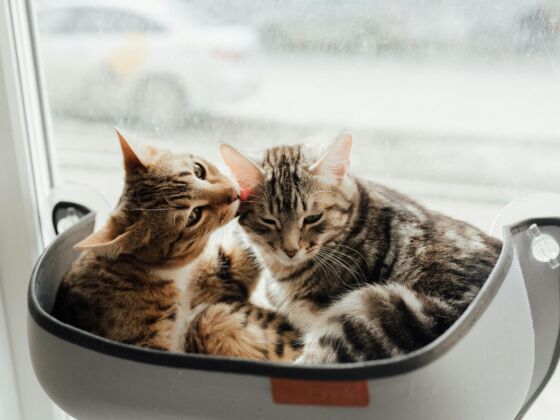
Your Cat: Indoor or Out?
While it is tempting to let your cat outside to hunt and play, we recommend keeping them inside if you want your cat to live a long and healthy life.
What’s so bad about letting them outside?
If you allow your cat to wander around on her own, without your supervision, she is susceptible to any of the following tragedies:
- Becoming hit by a car
- Ingesting a deadly poison like antifreeze, a pesticide, or poisoned mice.
- Becoming trapped by an unhappy neighbor
- Being attacked by a roaming dog, cat or wild animal
- Contracting a disease from another animal
- Becoming lost and unable to find her way home
- Being stolen
Following are some of the reasons people have provided for allowing their cat to be outdoors without their supervision, along with our comments and suggestions:
“I have a six-foot fence.”
Unless you have special fencing that’s designed to prevent a cat from climbing out, your cat will be able to scale your fence and escape the confines of your yard. Even if you do have special fencing, you need to make sure that it can keep other cats or animals from getting into your yard to get to your cat.
“My last cat went outdoors and he loved it.”
Your cat may enjoy being outdoors, but by allowing him to go outside, unsupervised, you’re putting him at risk and shortening his lifespan. Most cats that are allowed to roam outdoors usually don’t live for more than a few years. Cats who live strictly indoors can live up to 18 – 20 years of age. Consider purchasing a Catio to allow safe outdoor time.
“My cat’s litter box smells.”
Scoop your cat’s litter box on a daily basis. How often you change the litter depends on the number of cats in your home, the number of litter boxes, and the type of litter you use. Twice a week is a general guideline for clay litter, but depending on the circumstances, you may need to change it every other day or once a week. Wash the litter box with soap and water every time you change the litter. Don’t use strong smelling chemicals or cleaning products when washing the litter box, as it may cause your cat to avoid it.
“My cat likes to sun herself.”
Your cat can sun herself by any window indoors. If you’re really set on letting your cat sun herself outdoors, put her on a harness and leash and stay with her while she’s taking in the rays.
“I can’t keep him in.”
Keep your windows closed or put in screens. Remember to always keep your doors closed and teach your children the importance of keeping the doors closed, too. It may take a few days or a few weeks, but if there are enough interesting things for your cat to play with indoors, he’ll come to enjoy being indoors. Be sure to provide him with a scratching post and safe toys to bat or carry around.
“We’ve always let her out.”
You can change your cat’s behavior. It will take time and patience, but it might save her life. When you implement your “closed door” policy, give her a lot of extra attention and entertainment. At first she may cry, but don’t give in. Soon she’ll be happy to stay indoors with you.
“My cat knows to avoid cars.”
Even if this were true, all it would take is another cat, a dog or a shiny object to lure your cat into the street and into the path of traffic. Also keep in mind that some people may not swerve to miss a cat in the road.
“My cat needs exercise and likes to play with other cats.”
Stray cats are likely to spread viruses like feline leukemia and other fatal diseases. If your cat needs a friend, adopt another cat that’s healthy and disease-free.
“My cat yowls and acts likes he really needs to go outside.”
Your cat may be feeling the physiological need to mate. If this is the case, make sure your cat is neutered (males) or spayed (females). Sterilized cats don’t have the natural need to breed, and therefore, won’t be anxious to go out to find a mate.
Bottom Line: If your cat truly needs to spend time outdoors, be sure they are spayed/neutered, microchipped, up to date on vaccines, and protected with dewormer and flea control. These steps help to keep them healthy and increase the changes of a safe return home if someone mistakes them for a stray.

